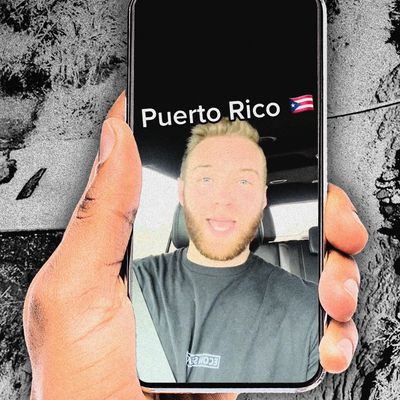
Hayden Bowles, a 22-year-old e-commerce influencer and landlord from Minnesota, was driving on the highway in Puerto Rico on Saturday when he recorded a video about the storm heading toward the island. “Two years ago I moved two of my companies down to Puerto Rico for tax purposes,” he told his 125,000 TikTok followers, referring to a law that allows newcomers to pay no taxes on capital gains if they live there for more than half the year. “Many people hate me for it. But check this out: We got some light rain.”
The “light rain” was the outer bands of Hurricane Fiona, which dumped as much as 32 inches of rain and knocked out power throughout the territory still recovering from 2017’s Maria, the worst storm in its modern history. Bowles was undeterred. “This is a big, big frickin’ storm and a lot of my friends who are down here as well for tax purposes, they bounced,” he said. “I got my heels in the sand. I want to see what it’s all about.”
Bowles’s next video was recorded in a high-rise apartment with the city around him in darkness. “Hurricane update: 100 percent of the island in Puerto Rico has no power,” he said. “Thankfully, we have a backup generator so we’re watching the game.” As the storm picked up and Sunday Night football beamed into his living room, he said he was going to get out after all — the tax-residency requirement was suspended during the emergency. He didn’t end up going very far. The next night, he was getting ushered around in a golf cart in a luxury complex owned by Ritz-Carlton that many of the island’s new-money elite call home. The coquis were chirping. The power was on.
Bowles’s documentation of his first major storm while living in Puerto Rico frustrated some residents who have seen outsiders enjoy tax advantages they are not privy to; anyone born in Puerto Rico, where over 40 percent of the population lives below the poverty line, is not eligible for the generous deal known commonly as Act 22. In the past five years, with the island still recovering from Maria and remote work made more viable by the pandemic, a wave of mostly white mainlanders involved in new ways to make money (drop shipper, cryptocurrency trader, influencer) and well-established ones (being a landlord) has moved to Puerto Rico, buying real estate and being accused of pushing out locals who pay their full tax burden.
When Fiona hit, outrage grew against Act 22 participants, such as the bitcoin investors flaunting their station or leaving before the storm hit to golf in New Jersey or attend a conference in Miami. Dean Huertas, recently laid off from a seasonal job at a Jet Ski–rental company, responded to the videos of Bowles making the rounds. “Everybody wants to live in Puerto Rico until it’s time to live in Puerto Rico,” Huertas said on TikTok. “For those who are living here with tax purposes and you took a quick flight back home, don’t get mad when you hear, ‘Go home. Stay home.’” On the screen in front of him reads the words: “G____o go home,” politely hinting at the word “gringo.”
“Just seeing the displacement of the local population, the natives being bought out of their homes or being told they can stay but they’re going to have to pay triple what they were originally paying or they gotta go was what bothered me,” Huertas said in an interview. “The people who are investing into their apartment buildings or their homes or trying to buy them out of their homes are all these investors, whether they’re in crypto or just well-off people who are buying out locals and displacing them.”
“Many of them say they’re coming here buying property, but who are you investing in?” asked Marilyn Figueroa. A Puerto Rican from the Bronx who moved to the island during the pandemic, she was priced out of her apartment near the beach in San Juan when, she said, a mainlander bought the building and doubled the rent. “You’re not creating long-term housing solutions. You’re creating Airbnbs and vacation rentals for non–Puerto Ricans.” She called Bowles’s widely circulated videos “insensitive” and out of touch with reality on the island: “He might think he’s just posting a funny video, but you’re not going to be impacted in the San Juan metro area like someone in the mountains, who is going to face mudslides and long power outages.” (Bowles did not respond to requests for comment.)
“The TikToks? Yeah,” sighed Gustavo Diaz Skoff, a start-up entrepreneur disillusioned by crypto investors he worked with who made big promises with little results. “Fiona reinstates that if what you have promised five years ago you delivered, the situation right now could have been much better,” he said. Still, he says there is a group of around 300 crypto investors on the island for tax purposes working on recovery efforts.
Huertas, whose new job as a waiter was put off indefinitely due to Fiona, worries that the storm will heighten the disparities between newcomers and locals. “I think people will look it as, ‘Oh, the land is cheap now because of the hurricane, now is the time to invest,’” he says. “My biggest fear is seeing a Puerto Rico without Puerto Ricans. I feel it’s going in that direction. It’s just hotel on hotel on hotel — a new hotel every week.”






























